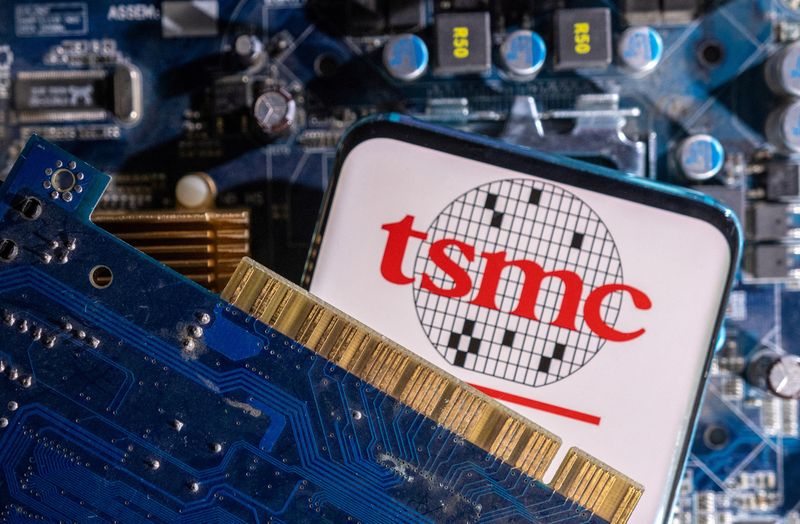Street Calls of the Week
Investing.com-- Taiwan Semiconductor Manufacturing Corp (TSMC) clocked a sharp rise in its second-quarter net profit on Thursday, beating market expectations as the chipmaker continued to benefit from robust artificial intelligence demand.
U.S.-listed shares of TSMC moved higher following the report, after having risen by 1.8% in Taiwan trading.
CEO C.C. Wei said that he saw few chances of AI-driven demand slowing in the coming months. But Wei flagged some caution over the fourth quarter of 2025, stemming from uncertainty over the impact of trade tariffs.
TSMC’s (TW:2330) (NYSE:TSM) net income rose 60.7% to T$398.27 billion ($13.52 billion) in the three months to June 30. The print was higher than Reuters expectations of T$377.4 billion, and translated to earnings per share of T$15.36 ($2.47 per American Depository Receipt).
Revenue jumped 38.6% to T$933.79 billion, the company said in a statement.
The robust print was driven chiefly by strong AI-fueled demand for TSMC’s 3 nanometer and 5nm wafer technology, which is a key component of advanced AI processors.
This helped offset a smaller revenue contribution from smartphone and device chip sales, as well as increased foreign exchange headwinds.
Taiwan dollar strength hits margins, but impact to be limited
TSMC’s gross margin shrank 5.4% year-on-year to 58.6%, largely due to pressure from a stronger Taiwan dollar. CFO Wendell Huang, speaking in a post-earnings call, forecast current quarter gross margin between 55.5% and 57.5%.
Huang said sustained strength in the Taiwan dollar, along with increased spending on its overseas operations– specifically the U.S. and Japan– were the main drivers of margin pressure.
The CFO forecast a 6% hit to current quarter revenue from further appreciation in the Taiwan dollar. Current quarter revenue is expected between $31.8 billion and $33 billion.
A stronger Taiwan dollar- which hit over three year highs in June-- was a major pressure point on TSMC’s earnings, given that the company makes nearly all of its revenue in U.S. dollars. The greenback also weakened this year on uncertainty over U.S. interest rates and fiscal health.
“Even with the unfavorable forex rate, we believe that a long-term gross margin of 53% and higher remains achievable,” Huang said.
TSMC maintained its 2025 capital expenditure budget at $38 billion to $48 billion.
AI demand to remain strong, but CEO Wei sees some tariff uncertainty
TSMC CEO Wei said that AI-driven demand for TSMC’s advanced chips remained robust, and that he saw few chances of this changing in the near-term.
Wei said TSMC’s 2025 revenue is expected to grow 30% in dollar terms.
But Wei said TSMC was positioning for some potential impacts from U.S. trade tariffs, when responding to an analyst question over TSMC’s 2025 outlook appearing somewhat conservative for the fourth quarter.
Wei also warned that tariff headwinds could hurt demand for non-AI chips.
"TSMC continues to be a key beneficiary of AI whilst navigating an uncertain environment," analysts at Barclays (LON:BARC) said in a note.
The world’s largest contract chipmaker, TSMC is a key supplier to AI-darling Nvidia (NASDAQ:NVDA) and other major AI server makers. The company has notched a stellar bump-up in earnings and valuation over the past two years, as global tech companies rapidly built up more AI data center infrastructure.
But focus is now on the potential impact of U.S. President Donald Trump’s proposed trade tariffs. While TSMC has committed a total $165 billion to building more production capacity in the U.S., to avoid said tariffs, it remains to be seen just how much of an impact the levies will have.
TSMC’s earnings come just days after chipmaking equipment giant ASML Holding NV (AS:ASML) posted stronger-than-expected second-quarter earnings, but raised doubts over revenue growth in 2026 due to potential headwinds from Trump’s tariffs.
The two firms are considered as bellwethers for the chipmaking industry, and at least in the near-term, expect sustained AI demand.
